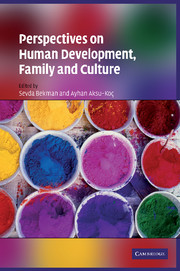Book contents
- Frontmatter
- Contents
- List of figures
- List of tables
- List of contributors
- Preface
- Foreword
- Selected international publications by Çiğdem Kağıtçıbaşı
- I Cultural and cross-cultural psychology: selected perspectives
- II Development in the family context
- III Culture and self
- IV Social change, family, and gender
- 13 One or two pathways to modernity? A systematic comparison of Kağıtçıbaşı's Model of Family Change and the Model of the Second Demographic Transition
- 14 Living together in culturally-plural societies: Understanding and managing acculturation and multiculturalism
- 15 Cultural continuity and discontinuity in Turkish migrant families: Extending the Model of Family Change
- 16 Values and attitudes of young people in urban Turkey: A further test of Schwartz's theory of values and Kağıtçıbaşı's Model of Family Change
- 17 Career development of professional women in Turkey
- V Induced change
- Epilogue
- Subject Index
- Author Index
- References
16 - Values and attitudes of young people in urban Turkey: A further test of Schwartz's theory of values and Kağıtçıbaşı's Model of Family Change
Published online by Cambridge University Press: 04 August 2010
- Frontmatter
- Contents
- List of figures
- List of tables
- List of contributors
- Preface
- Foreword
- Selected international publications by Çiğdem Kağıtçıbaşı
- I Cultural and cross-cultural psychology: selected perspectives
- II Development in the family context
- III Culture and self
- IV Social change, family, and gender
- 13 One or two pathways to modernity? A systematic comparison of Kağıtçıbaşı's Model of Family Change and the Model of the Second Demographic Transition
- 14 Living together in culturally-plural societies: Understanding and managing acculturation and multiculturalism
- 15 Cultural continuity and discontinuity in Turkish migrant families: Extending the Model of Family Change
- 16 Values and attitudes of young people in urban Turkey: A further test of Schwartz's theory of values and Kağıtçıbaşı's Model of Family Change
- 17 Career development of professional women in Turkey
- V Induced change
- Epilogue
- Subject Index
- Author Index
- References
Summary
My relationship to Çiğdem Kağıtçıbaşı dates back to the 1970s when I was an undergraduate at Boğaziçi University. It was her passion for a culturally sensitive psychology that inspired me to major in Psychology and to pursue a doctoral degree in the US. Having the privilege to be mentored by her as her teaching assistant and later her research assistant in the Value of Children project were invaluable experiences for which I am very grateful. Although her influence on my work is multilayered, her overarching concern with shifting the focus in mainstream psychology and her sense of social responsibility stand out as the most important ones. This current chapter is most closely influenced by her interest and work in the areas of family and values.
The concept of values has long been of key interest to scholars from different disciplines. Extending the work of previous theorists, Schwartz has presented a view of values as “the criteria people use to select and justify actions and to evaluate people (including the self) and events” (Schwartz 1992: 1). Through cross-cultural research in more than seventy countries, including Turkey, Schwartz (1992, 1994) has identified and uncovered ten motivationally distinct value constructs that are universally recognized: power (authority, wealth), achievement (success, ambition), hedonism (pleasure), stimulation (exciting life), self-direction (creativity, freedom), universalism (social justice, equality), benevolence (helpfulness), tradition (humility, devoutness), conformity (obedience), and security (social order).
- Type
- Chapter
- Information
- Perspectives on Human Development, Family, and Culture , pp. 263 - 283Publisher: Cambridge University PressPrint publication year: 2009
References
- 7
- Cited by

